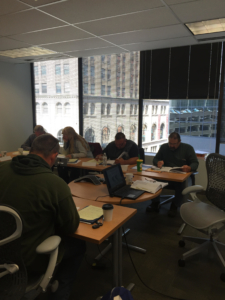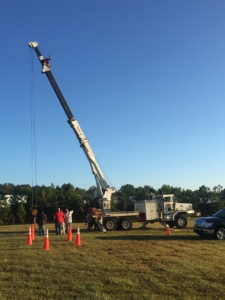Training and Skills Credentials Made Easy
Assembling the right crew or team, allocating work and knowing who is the best at what task is a daunting, but essential management responsibility. NCCER, the National Center for Construction Education and Research, has a system that Crane Industry Services LLC (CIS) utilizes to track knowledge and skills for thousands of individuals. CIS is able to use this information to help organizations plan work, schedules and budgets based on skilled crews who are ready and able to do jobs safely, correctly. 
More than assisting individuals to their potential, CIS also supports other organizations achieve training and credentialing goals. CIS is proud to be NCCER accredited as a training and assessment center. Its team makes good use of what NCCER has to offer. NCCER is the leader in developing skilled craft professionals, with more than 70 different types of skilled craft disciplines. Welders, pipefitters, electricians, crane operators, riggers, signal person and other craft workers train and test at the CIS Centered on Safety training center, to earn NCCER credentials.
“All employers are required to make sure their employees are qualified for the work being performed. Craft certifications are one type of documentation that demonstrates employee knowledge and abilities, especially when the certification is backed by an organization such as NCCER,” says Debbie Dickinson, CEO of CIS.
CIS helps employers establish their own training and testing, affordably, by providing administrative support, certified trainers and examiners. Organizations may also use their own in-house trainers when a company becomes a training unit or assessment site sponsored by CIS into the NCCER system.
“Working with a partner like CIS gave us the flexibility to provide training and testing for a variety of subject areas,” said Cranes 101 President, Jenn Sturm. Anna Debattiste of New England Crane School added: “CIS saved our business from extinction when we found that we suddenly needed a new certification provider. To become an NCCER Accredited Training Sponsor was very much beyond our financial and technical capability at that time, and based on our previous relationship with Debbie Dickinson we knew we had complete trust in CIS’s expertise, reputation and reliability. They have been an indispensable business partner since they sponsored us in early 2017,” said DeBattiste.
 CIS also tests or teaches for other industry partners who are NCCER accredited themselves, including an international construction company with tens of thousands of employees. The NCCER system supports flexible partnerships working together for common goals—to equip people with the knowledge and skills to perform safely.
CIS also tests or teaches for other industry partners who are NCCER accredited themselves, including an international construction company with tens of thousands of employees. The NCCER system supports flexible partnerships working together for common goals—to equip people with the knowledge and skills to perform safely.
One of the most important benefits of NCCER accreditation is the ability to offer industry recognized credentials for all types of craft training. CIS groups individual and organizational training records in the NCCER Registry System to track and manage credentials that are recognized nationwide. As new knowledge is acquired, people can be assessed and add new credentials to their records.
“Crane Industry Services holds multiple accreditations through NCCER, including being an Accredited Training Sponsor (ATS), Assessment Center (AAC) and Mobile Crane Endorsed Assessment Center. Being an ATS allows CIS to offer training both directly to an individual and through other organizations as training units,” explains Cathy Tyler of NCCER. “As an AAC, they are able to provide journey-level assessments which evaluates a higher level of craft learning and experience. With the Mobile Crane Endorsement, CIS can deliver the NCCER Mobile Crane Operator Certification program which is American National Standards Institute (ANSI) accredited.”
NCCER is a friendly, support-driven organization, with the most comprehensive offerings to businesses that rely on skilled workers. Sponsoring other organizations is one of CIS’s most enjoyable activities, says Dickinson. “NCCER brilliantly created a process for resource sharing that serves the end goal of keeping people safe and jobs running well and profitably because training—backed by subject matter experts—is accessible.”
